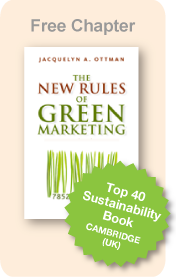Jacquie Ottman's
Green Marketing Blog
What’s Law Got to Do with It?
September 24, 2008 by Jacquelyn Ottman
An Australian law firm recently blamed fuzzy regulations by government bodies as a key source of confusion, and hence risk, for would-be green marketers. Is this a fair accusation? More importantly, is it even relevant?
While no government can be expected to stay completely current on a fast-moving green vernacular, it can be expected to define the territory in order to protect consumers from potentially fraudulent and misleading green terms. Government watchdogs such as the U.S. Federal Trade Commission and the U.K.'s Advertising Standards Authority are working hard to establish hard definitions for the many green marketing terms in use today, from "recycled" to "biodegradable" to "natural." Unfortunately, that's still very much a work in progress.
But as a green marketer charged with promoting and protecting a brand's good reputation, it's your job to consider the potential for risk in the current regulatory landscape (even as it's shifting beneath your feet!). So what can marketers do to craft an effective green message today? For starters:
Be specific and prominent. A seemingly straightforward green marketing term such as "made from recycled content," for instance, could imply a product or package was made from 100% recycled content - or just 10%. What's more, that "recycled content" could be pre-consumer waste (e.g., manufacturing scrap) or post-consumer (curbside pickup of paper, plastic and the like). he Wheaties box on your breakfast table carries the three chasing arrows symbol with an accompanying claim, "Carton made from 100% recycled paperboard. Minimum 35% post-consumer content." This claim is specific, and because it qualifies the exact amount of recycled materials, it prevents people from thinking the box is made of 100% materials collected at curbside, or is fully recyclable.
Provide enough information. When comparing your product's environmental benefits to those of a competitor's, provide enough information so that consumers can make relevant decisions. Make sure the basis for comparison is sufficiently clear and is substantiated by scientific test results. A green marketing claim such as "This bottle contains 20% more recycled content than our previous package" is preferable to the more ambiguous "This bottle contains 20% more recycled content."
Do not overstate. A Omaha, Nebraska, marketer learned this lesson the hard way when they attempted to market their antifreeze/coolant as "essentially non-toxic" and "biodegradable." Emotionally appealing advertising heralded, "It's not just antifreeze, it's safety freeze ... safer for kids, pets, and wildlife in the environment." Such claims were based on the fact that the anti-freeze was made with propylene glycol, while other coolants contained ethylene glycol. The problem was that proplyene glycol, although less toxic in absolute terms, still poses a hazard to pets and small children. By marketing the product as "safe," the company took the risk that consumers would be less cautious with a hazardous product. In addition, the "biodegradability" claim was essentially meaningless since all antifreeze is biodegradable.
Avoid vague, trivial, or irrelevant claims that can create a false impression of a product's or package's overall soundness. Broad labels such as "environmentally safe" or "eco-friendly," if used at all, should be qualified so as to prevent consumer deception about the specific nature of the environmental benefit being asserted. Instead, try something like this: "This wrapper is environmentally friendly because it was not bleached with chlorine, a process which has been shown to create harmful substances."
Qualify green marketing terms such as "energy-efficient," "compostable," "recyclable," "made from recycled content," "refillable," and "reusable. Answer questions such as: How much? For how long? By whom? Where? Compared to what?
Tell the whole story. Decide for yourself: Do you take issue with the fact that advertising once conducted by the U.S. Council on Energy Awareness touted the clean air benefits of nuclear energy but doesn't mention the radioactive waste it generates?
Test all claims with your target audience to make sure that the intended communication is what is in fact, being communicated. Hefty trash bags was once sued by state attorney generals in seven states for claiming that trash bags headed for landfills were "photodegradable." The only problem? There's no sunlight in landfills, and consumers believed that the bags would degrade in landfills anyway.
Jacquelyn A. Ottman,
President, J.Ottman Consulting
Click here to join our mailing list.



 ShareThis
ShareThis

